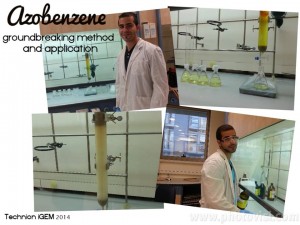Technion iGEM 2014
Two years after winning the gold medal: A team of Technion students once again enters the international iGEM Competition, with a novel technology capable of identifying toxins in food
A device developed by 11 students from the Technion and one student from the Wizo Haifa Academy of Design and Education will compete in the upcoming International Genetically Engineered Machine (iGEM) competition. Two years ago a group of Technion students entered the competition for the first time and won the European gold medal. The medal was awarded to the team for the development of the “Trojan Phage” technique for drug delivery via viruses.
The 2014 iGEM competition, to be held in October at The Massachusetts Institute of Technology (MIT), aims  to encourage students to independently advance a whole research project in the area of synthetic biology.
to encourage students to independently advance a whole research project in the area of synthetic biology.
Synthetic biology is an emerging field that combines knowledge from various disciplines in science and engineering, to develop genetically engineered systems that respond to their environment. About 250 teams from universities all over the world will take part in iGEM. Contenders are required to present their projects in its entirety – including concept development, economic model, proof of concept, and so on.
The system proposed by the Haifa-based group, “Safie”, is a bio-chemical mechanism that detects toxins or allergens in food, water and more. The device identifies the presence of toxins, mercury, gluten, nuts, and other contaminants even at low concentrations. The system uses genetically engineered E. coli bacteria to illuminate a green light that signals concentrations of toxins or allergens in the food or beverage tested. “The idea is to provide individuals a way to check for substances in their foods on their own,” explains Rebecca Feldman, an undergraduate student from the Faculty of Biotechnology and Food Engineering at the Technion, who heads up this team. “The device itself will resemble a kind of stick carrying the group of bacteria appropriate to the specified material, and we propose to engineer the bacteria so that even if one of them identifies the harmful material it will illuminate them all.”
Feldman, who heads up the student team, was born in the US and raised in England; she first came to Israel for a visit at 17 as part of a youth delegation. “I immediately realized that I want to live here (in Israel), and after two years I came back permanently,” she related. She volunteer for military service and served for two years in the Technological Division of the IDF, where she met many engineers and Technion graduates – including her future husband – and at the end of her military service she began to study at the Technion. She is currently completing her BSc in Biotechnology and Food Engineering and preparing for the iGEM competition (which is also part of her final project at the Technion).
She first heard of the competition in 2012, when the Technion delegation returned with a gold medal. Feldman was very excited about the winning and asked to become a part of the next delegation scheduled for 2014. “In early 2013 we began to learn about the competition, browse through past teams’ work, and think about ideas. Over the previous summer we went through a practical course in synthetic biology, and in January we started working in the laboratory, under the direction of Assistant Professor Roee Amit at the Faculty of Biotechnology and Food Engineering, alongside other faculty researchers.”
Till now the group raised partial funding for the project from various entities, including biotechnology companies, and opened a crowdfunding account (http://www.headstart.co.il/project.aspx?id=10603) to help pay for the flight and accommodation expenses while abroad. “We even solicited donations from family and friends,” added Feldman, “but we are still short about $12,000.”
In parallel with their preparations for the competition, members of the group are working on a project entitled “Synthetic Biology in 3-Languages.” This project, conducted in Hebrew, English and Arabic, is designed to provide common ground for conversation and collaboration work between Arabs and Jews through the world of synthetic biology and science. Within the framework of the project, team members conduct enrichment lectures and hands-on laboratory sessions, and act as visiting mentors at national science events. “Our emphasis is on encouraging mixed groups of Jewish and Arab youth, through the belief that science transcends boundaries of religion, culture and tradition.”


